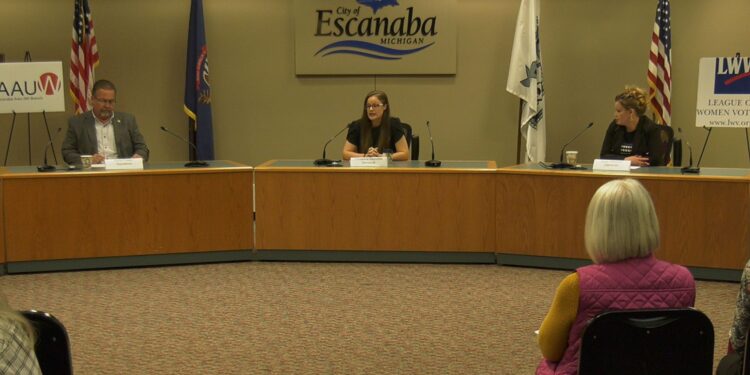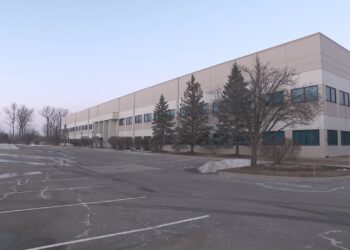ESCANABA, Mich. (WZMQ) – On Wednesday, candidates on both the city and state level addressed key voter issues at a Delta County League of Women Voters forum.
Three candidates are vying for a partial term on the Gladstone City Commission. Incumbent Steve O’Driscoll faces challengers Mike O’Connor and Steven Viau.
A major point of debate among voters is special assessments—which allow municipalities to put millages in place for public services—and a ballot proposal to eliminate them. The issue came to the forefront in June, when the City Commission approved a special assessment starting at 4.5 mills to fund Public Safety.
When candidates were asked for their position on the ballot proposal, O’Driscoll said special assessments have been benefitting residents for 135 years.
“This is not a new thing,” he said. “The residents who directly benefit from the improvement in the neighborhood pay a portion—a small portion, usually—of that improvement, and I am all for keeping special assessments by voting no on the proposal.”
O’Connor said the City has been misusing special assessments.
“The citizens have to be able to vote whenever there’s a tax increase,” he said. “That’s the problem the City has is they want to be able to have two meetings or three meetings and say, ‘Well, we’re going to have a special assessment and we’re going to charge you this much money,’ and effectively, there is nothing you can do to stop it once they get that going.”
While outgoing Delta County Commissioner Steven Viau said he does not like special assessments, he called them a “necessary evil for the right purpose.”
“I think it’s mismanagement somewhere down the line where we’re not looking at where the funds should be channeled to do what needs to be done on a perpetual basis of every 10 or 20 years,” said Viau.
Another divisive topic was what, if anything, should be done to regulate Airbnb and vacation rental properties. Commissioner O’Driscoll believes it is an issue the City of Gladstone needs to “get ahead of” by putting limits on such properties.
“I’ve watched small communities like Grand Marais and similar-size communities like Munising be destroyed by Airbnbs,” he said. “Essentially you take a family home… that home gets sold for a reasonable price, and it gets turned into a cash cow being rented out for $1,000 – $1,500 dollars a week when the local residents… can’t afford housing because every house that comes available is now a $4,000 – $6,000 a month cash cow.”
O’Connor said he holds “more of a free market” approach.
“There really isn’t a place in the City as far as regulations… I think that would basically come down from the state level,” he said. “We want to basically encourage people to have those type of operations. We would like people to come to town and be able to stay in a nice place.”
Viau said if someone purchases property within the proper zoning district for operating a rental property, “so be it.”
“I just like that freedom to be able to do and make money the way you feel you can make money,” he said. “I don’t think an individual that does run an Airbnb should worry about other housing in the community. If the City of Gladstone can’t handle it, it’s not up to the individual that invests in our community to be denied their investment to keep it as a house.”
In the race for the 108th District seat in the State House of Representatives, Republican incumbent Dave Prestin faces two opponents—Democrat Christiana Reynolds and Libertarian Kayla Wikstrom.
Each candidate showed passion when it came to solving problems within the Michigan Department of Corrections. Representative Prestin promoted increasing incentives for officers.
“These corrections officers need some certainty in their career,” he said. “We definitely need to consider and vote back in the pension system for them, a look at healthcare, and a considerable step up in pay. They start out at $22 an hour with a cap of $33. They need to start out at about $32 – $33 and cap out at $45.”
Reynolds also supports pay increases. Additionally, she advocated for finding ways to prevent potential crimes.
“We also need to look at the rate of incarceration and really see how we can create programs to help people, you know, before they get to that stage,” said Reynolds. “I think we really need to think about it holistically from beginning to end and then address it as we work through it.”
Wikstrom said she looks at the issues with the Department of Corrections “kind of backwards.”
“I understand that we want to get more guards, but I just want to figure out how we get less prisoners,” she said. “First of all, we have more prisoners in the state of Michigan than 17 small countries have their entire population. 45% roughly—this is in 2022 so maybe it’s changed—are non-violent, victimless crimes… I think the fact that you can lock up people who are not a threat to society is a huge part of our issue.”
The 108th District candidates were also asked what ideas they have to improve the availability of housing. Prestin cited workforce availability, inflation, and material costs as the “biggest aggravators” when it comes to adding housing.
“You can’t affordably build anymore,” he said. “In a lot of the ways, the government is getting away on this. For the Energy Optimization Program, they’re moving over towards building codes and specifying specific insulation, specific windows, specific doors that are much more expensive than your traditional materials that are used. They’re only pushing up the cost of homes. In the end, we need government to get out of the way.”
Reynolds suggested diversifying the types of homes and apartments in the district.
“Single-family homes is not for everyone,” she said. “… Where should we put in single-family homes? Where can we put in apartments? Where can we put in condos and townhomes and rally follow people through their entire life as the needs of their family change? …I feel like it’s really the state’s position to support localities in their pursuit of additional housing.”
While Wikstrom said she “didn’t really realize that there was a major housing crisis,” she said she would like to learn more about it. She said the issue of affordability would be a result of the economy and “outside a legislator’s position.” She then turned her focus to addressing the growing problem of addiction in communities.
“A lot of it really comes down to the breakdown of the quality of the people in the community,” said Wikstrom. “When you have 70% of the babies being born addicted, that means 70% of the parents are addicted. They’re not in the workforce, they’re not in the community, and they’re not building it up. Some of these things, they’re almost a luxury to fight about… We literally have to figure out what we’re going to do with our prisons and our addiction and just individuals.”
To watch the candidates’ full statements on these and other issues, click here. Click here for WZMQ 19’s story on forum highlights from candidates in contested Delta County Commission races.









